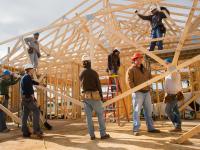California construction workers: Help wanted!
For a modest price.
The Associated General Contractors of America trade group released a survey last week detailing a growing concern in real estate circles: The industry may be running out of construction workers. Depending on the metric, the tightness of the regional and national construction job market is at or above pre-recession levels.
That may be good for workers, who stand to get more opportunities along with some pay hikes. But the trend unnerves construction executives, who scramble to make projects pencil profitably and worry they may not be able to take on all jobs as demand grows for building everything from homes to roads to schools to office towers.
The contractor group’s national survey isn’t robust polling science at the state level, including just 43 California construction firms. But it’s enough of a sample to show the concerns.
The poll found general optimism, with 88 percent of California construction bosses saying they’d be hiring hourly craftsman in the next 12 months.
But who will fill those slots?
The survey showed 80 percent of the same bosses say they’re having difficulty filling current open positions; 38 percent think these “hard to hire” conditions will continue through the next year; and another 33 percent of executives think hiring will only become more difficult.
The hardest workers to find are pipe fitters/welders (83 percent of the firms reported difficulty filling these spots); plumbers (80 percent); electricians (63 percent) and equipment operators (59 percent).
The shortage is amplified by growing competition for labor, with half of the California construction company bosses reporting they have lost workers to local or out-of-town competitors or to other industries.
The anxiety of California bosses about finding sufficient craftsmen was echoed in their worries about being able to fill construction supervisory jobs – from engineers to project managers. The poll showed similar problems throughout the building industry nationwide.
“There’s not a deep bench anywhere,” said Ken Simonson, the AGCA’s chief economist.
The shortage is primarily tied to the harsh construction downturn of the Great Recession and the slow recovery that followed. Nearly half of California’s construction workers lost their jobs in the downturn.
It’s long been a volatile industry, but the severity of the downturn soured many veterans of the trade. They’ve either retired or moved on to other industries.
Industry officials also blame a lack of trade school options offered to high school students, which they say limits potential new workers’ knowledge of the industry. Public schools often direct kids toward office-based careers rather than jobs in which they’ll get their hands dirty. The industry hopes to create its own training programs to boost the number of new workers entering the field.
The overriding threat is that the labor shortage could translate into projects getting done late, poorly or not at all.
In my view, the rub is that salaries are not properly compensating people for the industry’s painful boom-to-bust cycles. Too many workers have decided the financial roller coaster isn’t for them.
California construction firms employed 734,800 workers in July, state jobs data show. That’s 202,100 above 2011’s bottom and is the highest level of construction employment in seven years.
But the industry should note that despite that recovery, California is still 231,000 construction workers short of the 2006 peak. Why aren’t they clamoring to come back?
Yes, 68 percent of the construction bosses polled said they’ve increased compensation in some form to keep or lure craftsmen. Yes, metrics tracking industry pay show salaries on the rise. But the increases seem very modest considering the assumed labor shortage.
Contractors speaking on a conference call last week to discuss the survey results insisted that tightfisted project developers – both from private industry and government – don’t leave a lot of wiggle room in construction contracts to allow for much greater worker pay.
“Construction salaries are not where they should be,” said John Finch, CEO of PBG Builders in Goodlettsville, Tenn. “There’s so much pressure to drive construction costs down.”
The average annual California construction salary is up 8 percent in the four years ended in 2014, according to one government pay measurement.
Not terrible in an era when any raise is to be cherished. But in the four years through 2008 – the boom times right up until the bubble burst – construction salaries rose 24 percent.
We don’t want to go back to last decade’s easy-money days, which ultimately inflicted great harm on the entire real estate world.
However, if today’s worker shortage is real, the industry will have to pay up to get folks to join or rejoin the industry.




Comment (0)